Key takeaways:
- Music licensing is essential for protecting artists’ rights and creating monetization opportunities through proper permissions.
- Securing a license requires understanding different types of licenses, preparing documentation, and networking with potential licensees.
- Rejections are part of the licensing journey, emphasizing the need for persistence and resilience in pursuing opportunities.
- Clarity in communication, strong networking, and openness to feedback are crucial for successful music licensing.
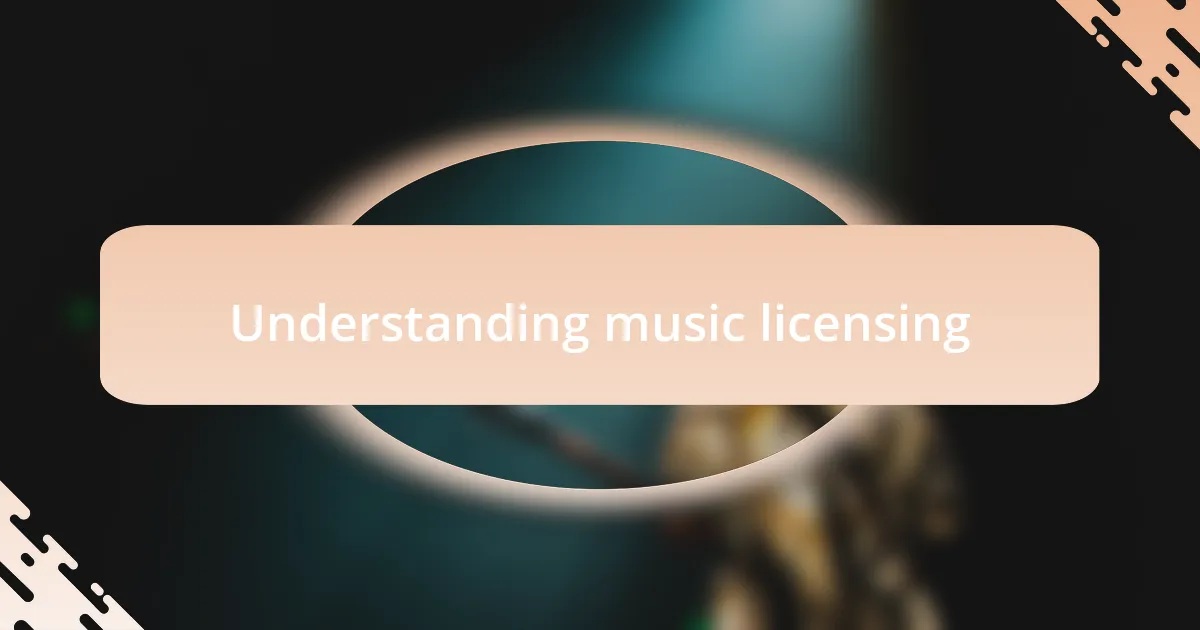
Understanding music licensing
Diving into music licensing can feel overwhelming at first. I still remember the first time I encountered the concept; I was puzzled by all the terms and legalese. It was a moment that made me realize how crucial it is to grasp what licensing actually entails for anyone in the music industry.
At its core, music licensing is about permission. Think about it—when you hear a song in a film or on a commercial, that music is not just there by chance. It’s vital to remember that each time someone uses a song, they need the appropriate license to avoid legal issues. The first time I secured a license for my own track felt like a rite of passage. I felt empowered, but also a bit intimidated.
Have you ever thought about how your favorite songs became part of a larger project? Understanding licensing helps musicians protect their work while also opening doors to new opportunities—like placements in movies or ads—as I learned firsthand when one of my songs found its way into an indie film. It made me realize how music can transcend its initial creation and touch lives in unexpected ways.
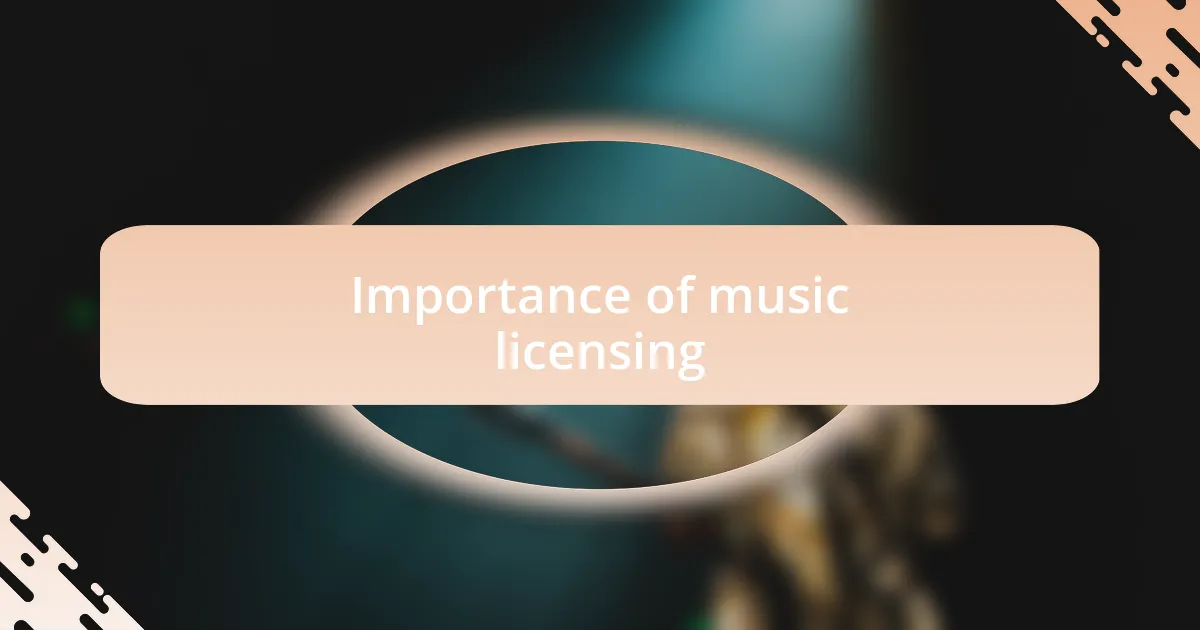
Importance of music licensing
Having a solid grasp of music licensing is essential for any artist looking to monetize their work. When I first navigated this aspect of the industry, I quickly learned that securing the right permissions not only grants legal safety, but also creates pathways for earning potential. It’s fascinating how an understanding of this process can elevate a musician’s career, turning a passion into a sustainable livelihood.
One time, I remember negotiating a sync license for a track that was placed in a popular web series. The excitement I felt as I signed that agreement was palpable; it underscored just how impactful music licensing can be. It allows creators like me to see their art in new spaces, gaining recognition and providing a financial reward. I often wonder how many artists miss out on similar opportunities simply because they overlook the significance of licensing.
Moreover, music licensing fosters respect for artists’ creative rights. Every time a song is licensed, it affirms the value of the creator’s work. I often reflect on the importance of crediting original artists; after all, every song has a story and deserves recognition. By understanding and participating in the licensing process, musicians can cultivate a community that respects creativity while paving the way for future projects.
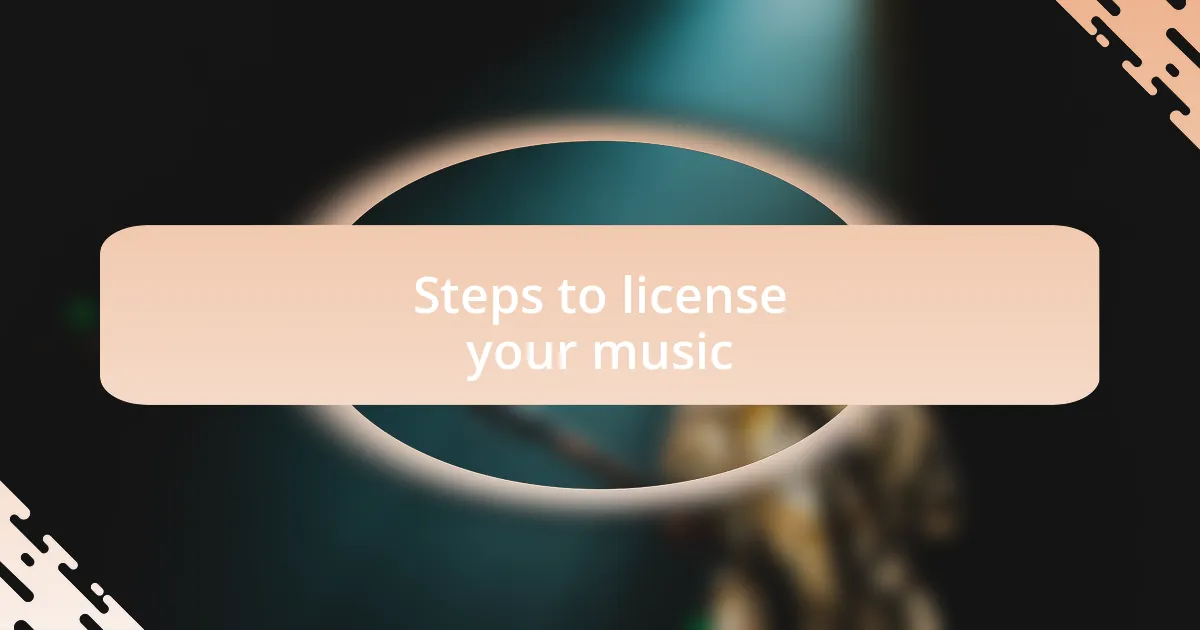
Steps to license your music
When I decided to license my music for the first time, I quickly learned the importance of identifying exactly what type of license I needed. It can be overwhelming, but breaking it down into steps makes it manageable. For instance, understanding the difference between a mechanical license—necessary for physical copies—and a synchronization license for film or TV was crucial for me. Have you ever considered how different your path might be depending on the type of project you’re targeting?
Next, to prepare my material for licensing, I ensured I had all the necessary documentation and clear ownership of my tracks. I made a checklist of what I needed, including registering with a performance rights organization, which was eye-opening. I still remember the relief when I realized how this step would simplify the process and protect my rights. Isn’t it interesting how a little preparation drastically shifts the experience?
Finally, approaching potential licensees was a step I found both nerve-wracking and exhilarating. I opted to network with music supervisors and content creators directly, sharing my work on platforms tailored for licensing. The moment I received my first offer—an indie short film wanting to use my song—was a rush of validation and excitement. I often think about how such personal connections can lead to remarkable opportunities. What if approaching the right person could change the course of your career?
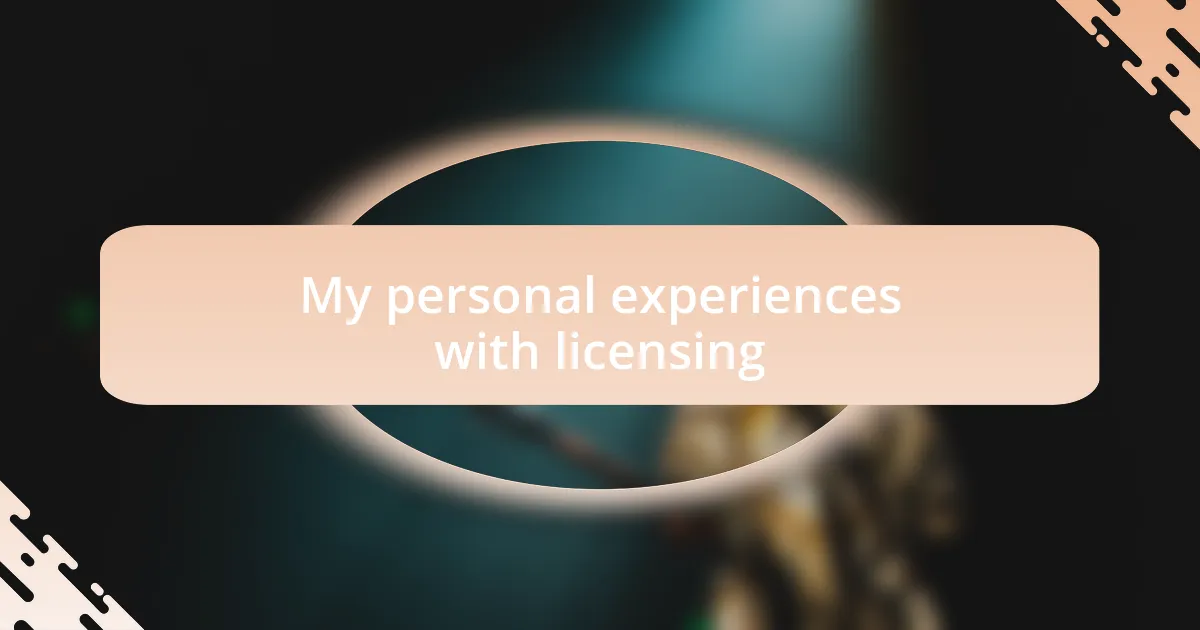
My personal experiences with licensing
When I first navigated the licensing landscape, I remember feeling both excited and apprehensive. I took my time to research different platforms, seeking advice from peers who had been successful in licensing. One day, I stumbled upon a community forum where musicians shared their stories, and one particularly inspiring tale pushed me to take the plunge. Have you ever found encouragement in someone else’s journey?
As I started submitting my tracks for licensing, I faced rejections that tested my resolve. It was tough to remind myself that this was part of the process. I recall one instance where I submitted a song I was passionate about and received a polite “not this time” response. Initially, it felt like a setback, but I chose to view it as a stepping stone instead. How often do we miss opportunities because we take rejection too personally?
Then came the breakthrough moment when I secured my first licensing deal—a local ad campaign that perfectly matched the vibe of my music. I can still vividly recall hopping around my living room in sheer joy. That moment highlighted how persistence pays off. From that experience, I learned that sometimes, breaking through feels like a thrilling roller coaster ride. Isn’t it fascinating how a single opportunity can shift everything you thought you knew?
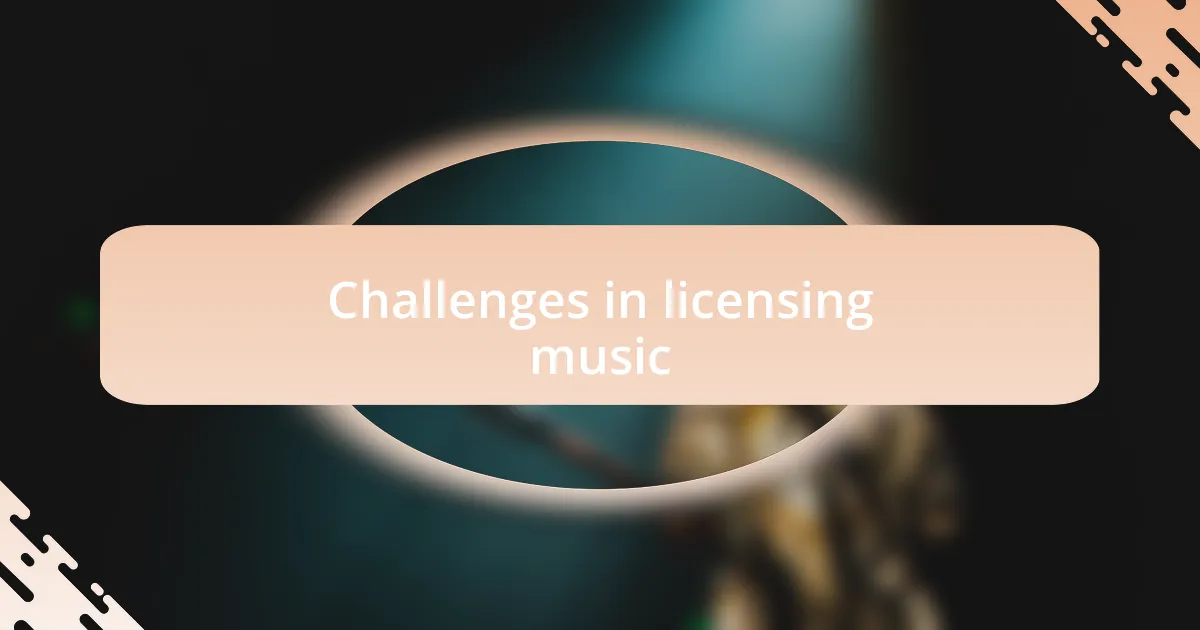
Challenges in licensing music
Licensing music often introduces a labyrinth of legal complexities that can be overwhelming. I remember the first time I had to navigate a contract; I felt like I was deciphering a foreign language. Have you ever been in a situation where the fine print seemed to outweigh the excitement of the opportunity? It’s crucial to pay attention to those details, as they can make or break a deal.
Another challenge I encountered was the fierce competition in the licensing space. There were moments when I felt like a small fish in a vast ocean, with countless other talented musicians vying for the same opportunities. It became clear to me that standing out wasn’t just about having great music; it required a unique angle or vision. How can you ensure your work not only shines but also resonates with potential licensors?
Then there are the unpredictable dynamics of the industry. I remember one particular licensing pitch where I felt confident yet uncertain about the song’s fit. Watching my work be evaluated was both nerve-wracking and exhilarating. I often wonder if others feel that same blend of anticipation and fear when putting their creations out there. In this ever-changing landscape, adapting to feedback, while staying true to your artistic voice, is a delicate balance to strike.
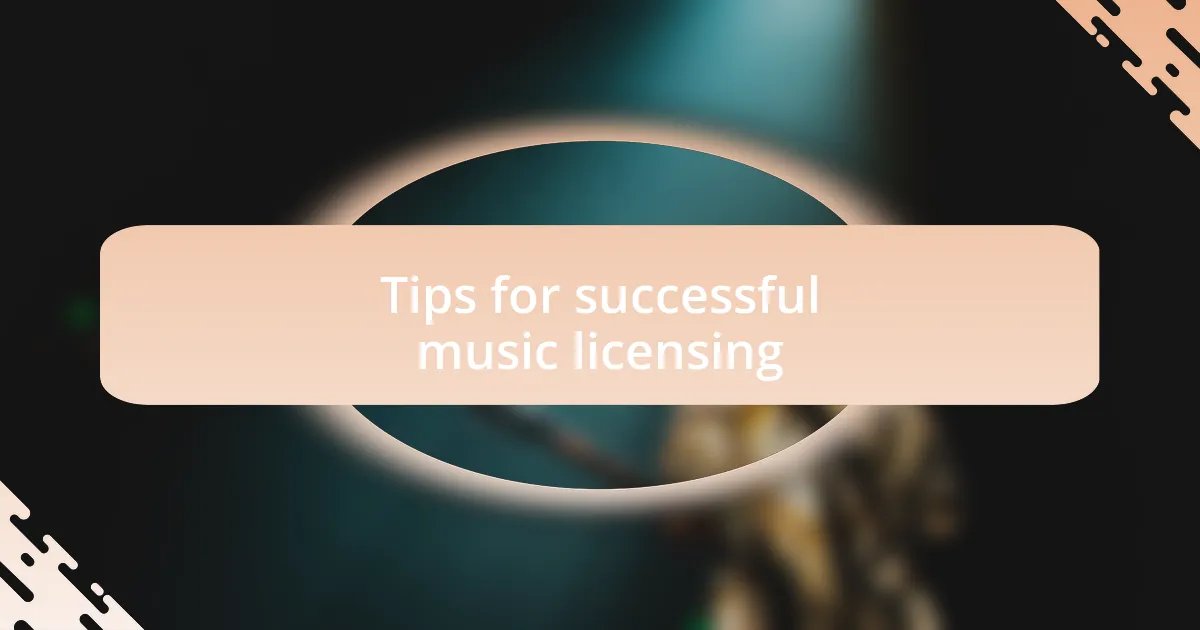
Tips for successful music licensing
When it comes to successful music licensing, clarity is paramount. In my experience, having a well-defined brief can make all the difference. I recall working on a project where ambiguity led to misalignment and ultimately a missed opportunity. How can you avoid this? By ensuring that everyone involved—from yourself to the potential licensor—completely understands the expectations and goals.
Networking plays a critical role too. I once attended a music convention where I met a licensing executive who later became an invaluable ally. That experience taught me that sometimes it’s not just about the music but who you know in the industry. Have you considered how your relationships could open doors you didn’t even know existed?
Lastly, embrace feedback with an open heart. There was a time when I hesitated to change a track based on a suggestion, fearing it would dilute my vision. Yet, when I finally made adjustments based on constructive criticism, the track flourished in ways I hadn’t imagined. Isn’t it fascinating how a little openness to change can lead to unexpected growth?